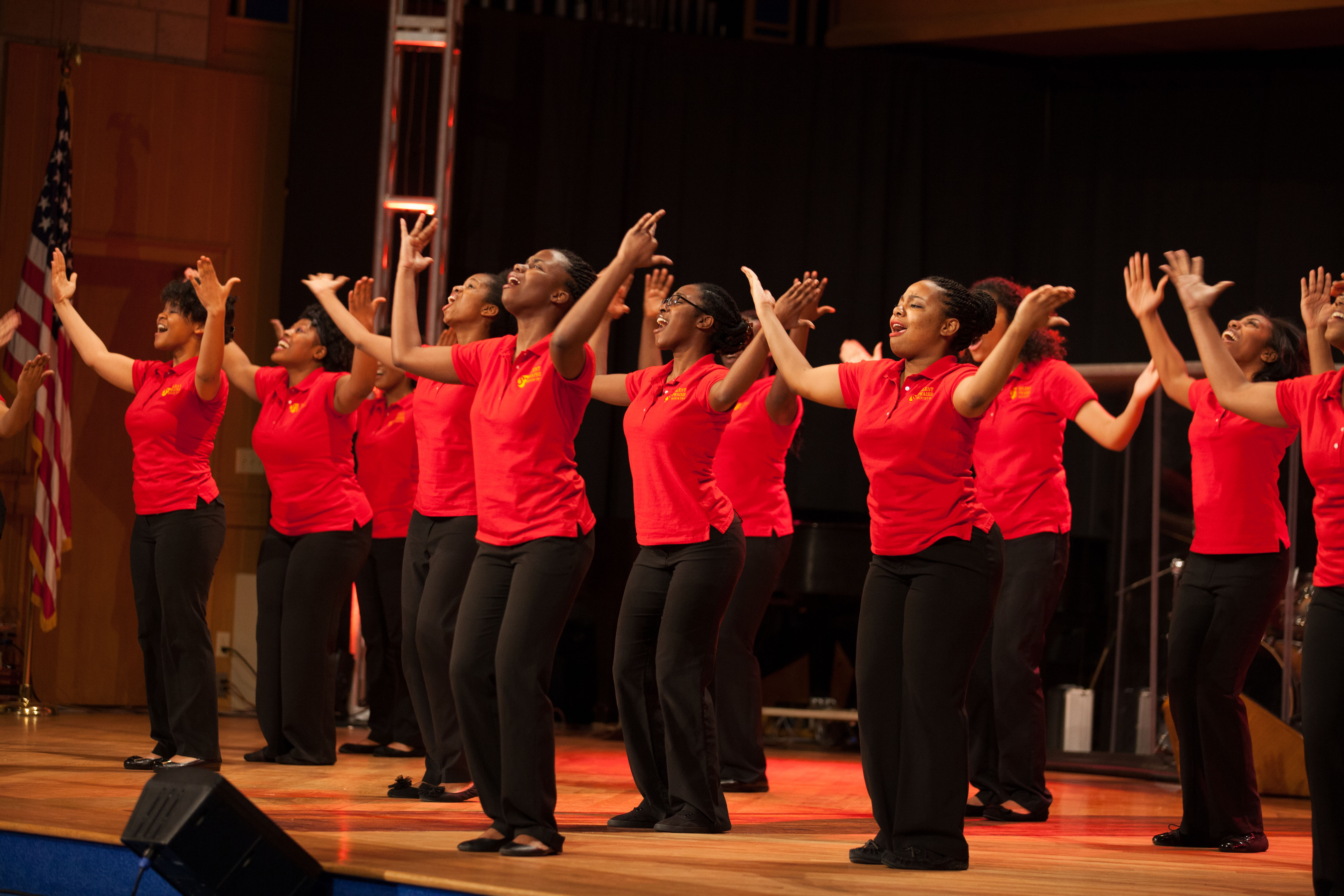African American
Currently African American students make up 27% of the student population at Andrews University. There is a rich tradition of support and programming for African American students. One of the most active clubs on campus is the Black Student Christian Forum (BSCF) and each Friday night Burman Hall Auditorium is packed for Impact, the popular after vespers program featuring powerful speaking and music in a high-spirited and animated atmosphere.

Andrews University students can also enjoy a traditional African American worship service each Sabbath in the Seminary Chapel. New Life Fellowship began in 1991 to serve the worship needs of a diverse student body and is a student led worship service that features an energetic gospel choir and praise band, a warm church family hospitality, and power-packed preaching from the Word. New Life Celebrates 20 Years
African Americans at Andrews University are drawn from a diverse range of cultures and countries in Africa, the Caribbean and from Central and South America. They share a history of enslavement, acculturation, and racial oppression which creates the initial bond of African heritage. This culture is unique, rich, and distinctive. It is an experience that is rooted in the injustices of slavery and the continuing legacy of that institution in its many form of discrimination and oppression. The African American has distinct cultural patterns- patterns of speech, music and dance, patterns of self-expression and relations- which were produced by this history, but are now surviving and flourishing with its own creative energy and integrity.
Current Facts and Demographics
According to the 2012 United States Census Bureau, African Americans account for 14% of the total population. It is estimated that there were 313.9 million Americans, meaning that over 44 million African Americans are a part of the United States Population. This includes those who identify as ‘Black Only’ as well as ‘Black in combination with another race’. The ‘Black Only’ category totaled 41.2 million African Americans or 13.1% of the total U.S population.
The projected black population of the United States (including those of more than one race) for July 1, 2060 is 77.4 million. On that date, according to the projection, blacks would constitute 18.4 percent of the nation’s total population. As of July 1, 2011, New York leads all states with the largest population of blacks with around 3.7 million. Texas had the largest numeric increase since April 1, 2010 (84,000). The District of Columbia had the highest percentage of blacks (52.2 percent), followed by Mississippi (38.0 percent).
Click here for a brief history of African Americans in the United States
Legal Issues
The vast majority of African American legal issues (like most other ethnic minorities) arise from issues stemming regarding racial discrimination, violence, or unjust actions. The following pieces of legislation are the two most prominent pieces of legislation in African American legal history as well as a helpful website concerning the issue of African American legal issues.
Civil Rights Act 1964 - This act of legislation prohibited discrimination on the basis of race, color, religion, sex or national origin.
Voting Rights Act 1965 - This piece of legislation, which followed the year after, prohibited the denial of the right to vote based on literacy tests.
Black Legal Issues - BLI reports on the legal and racial injustices occurring daily in black communities.
Resources
• NAACP – National Association for the Advancement of Colored People - Founded in 1909, the NAACP is the nation’s oldest and largest civil right organization.
• National Council of Negro Women - Founded in 1935, its mission is to lead, develop and advocate for women of African descent as they support their families and communities.
• National Urban League - A civil rights organization focused on the economic empowerment of underserved urban communities.
• African American Cultural Center - Established in 1958. It “has enabled spirits to soar and offered sanctuary, validation and celebration for the duality of being African and American.”
• United Negro College Fund (UNCF ) - Minority higher-education assistance organization; founded in 1944.
• 100 Black Men of American - Founded in 1976 with the mission to improve the quality of life within the black community and enhance educational and economic opportunities for all African Americans.
• College Campus Inclusivity for Black Men: An examination of key factors for Black male students' success.
• Scholarship Guide for African Americans: These awards can help offset the cost of a college education, and leave students less dependent on loans. They also offer African Americans a unique opportunity to pursue financial aid without any strings attached, and without any racial biases favoring another demographic, intentionally or otherwise.
• Resources for Black College Students: Black college students can access resources designed to rectify historical imbalances, including scholarships, financial aid, career development opportunities, and student groups.
• An educational guide to how to best navigate the barriers to equitable addiction treatment in health care, which disproportionately affect the Black, Indigenous and People of Color (BIPOC) community.
• Financial Aid for Minority Students: An open-use guide that provides an overview of some MBA minority scholarships, as well as other funding opportunities.
• Addressing Racism in Higher Education: From Indifference to Inclusivity: A Dwain Ford Lecture Series sponsored by the Andrews Chemistry & Biochemistry department; the lecture explore barriers to making higher education more inclusive, particularly STEM and will provide examples of changes to make higher education and STEM more diverse and inclusive.
• Eye Disease in Black & African American Communities: This guide covers key issues, including: important vision health topics such as: Eye Diseases & the African American Community; The Leading Cause of Blindness, Why Does Race Matter; and Treating Glaucoma in Black Patients and more.
